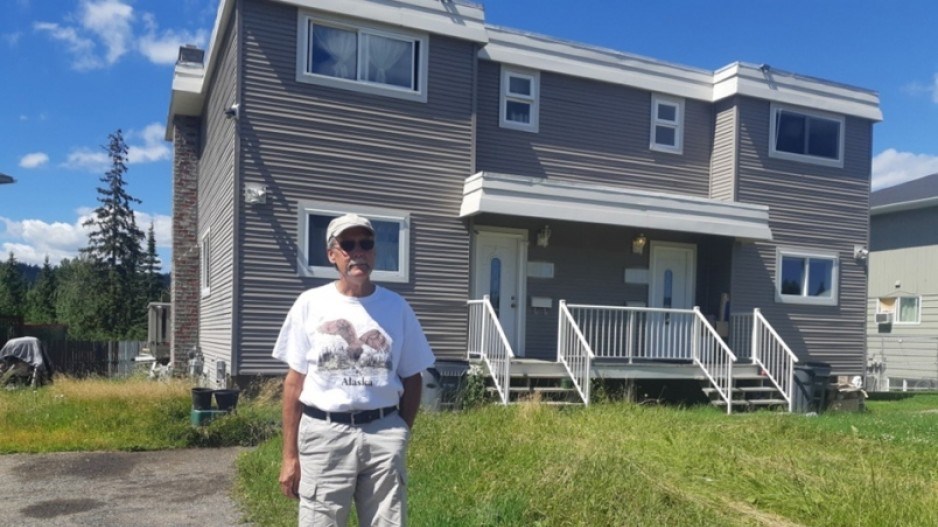After months of missed rent payments from his tenants during the pandemic, Prince George landlord John Stiles is feeling the pinch.
Stiles says he’s had to dip into his line of credit to pay the mortgage, taxes and utilities of rental property he and his business partner own in Prince George and Mackenzie because the renters in two of those properties haven’t paid their rent, one of whom hasn’t paid since April.
That tenant’s refusal to maintain the property on his side of a duplex Stiles owns on McIntyre Crescent is evident in the trampled-down foot-high grass that used to be a lawn and now has become a driveway for the tenant’s truck.
The province-wide ban on evictions for reasons other than missed or late payments, in place since the pandemic broke out in March, was lifted on June 25. But property owners are not allowed to begin the eviction process for non-payment of rent until Sept. 1.
Neither of Stiles’ delinquent renters qualifies for the province’s COVID-19 temporary rental assistance program and he wonders why there’s no alternative plan in place to help landlords who are now owed thousands of dollars in missed rent payments.
“There’s no relief and I think it’s a gross injustice that nobody wants to talk about,” said Stiles. “There are no programs for a landlord to access on his own initiative and there’s absolutely no other option for eviction other than if he is doing severe damage to the property. You are stuck with this person who refused to pay rent . I was told point blank that I would not be getting a nickel of rent out of him.
“A lot of renters are under the impression that COVID meant you don’t have to pay your rent. The government did say you still have to pay your rent, if you can. If he says he’s not paying, you can take him to an arbitrator to get the money, but at the time, in late May, that took four months just to get into a hearing and then get a judgment to collect the money.”
Stiles questions why the B.C. Residential Tenancy Branch is not making its arbitrators available to consider cases like his, where he says his tenant is still working but refuses to pay the rent and now owes close to $5,000.
“Everybody’s taking it on the chin during COVID, but if you have a $400,000 investment that you’re financing there’s nothing you can do other than wait the six months or so to start collecting, if [a tenant is working and hasn’t moved on,” said Stiles, “It’s a tough, onerous process. In the last 10 years they have vilified the landlord so much, there’s no sympathy for them.”
The Ministry of Municipal Affairs and Housing announced in June it was extending through August its moratorium on evictions for renters who can demonstrate they aren’t able to pay their rent. The province also extended its temporary rental assistance payments until the end of August. The program provides renters who qualify up to $500 per month paid directly to landlords.
Stiles, a former rooming house and apartment building owner, has been renting to low-income tenants since 1994 and out of those hundreds of tenants he says he’s had to go to the Residential Tenancy Branch only three times to settle a dispute. Now, during the pandemic, he has two of those cases at hand.
“They’ve taken your teeth away, you can’t encourage anybody to resolve anything if they don’t want to,” Stiles said.
“From my perspective, in a zone where there’s been 79 cases of COVID in four months and people were continuing and able to go to work, so there was exposure in the community, they were protecting these people from having to pay any rent whatsoever with absolutely zero recourse, other than you could take them to court.”
Two weeks ago, the B.C. government released guidelines for landlords seeking rent unpaid during the pandemic which gives tenants until July 2021 to make those gradual payments over a 10-month period. It puts the onus on the landlord to work out a payment plan with the tenant and present it at least 30 days before the first payment is due. Assuming that notice is given, the first repayment installment would be due on Oct. 1.
The July update, announced by Municipal Affairs and Housing Minister Selena Robinson, also extended the freeze on rent increases through to the end of December. Robinson also said people who vacate rental units without paying their landlords could be subject to an investigation by the compliance and enforcement branch of BC Housing.
Landlord BC, an advocacy group for rental property owners which has 3,300 members, says the state of emergency that’s been extended by the province through August 4 is causing undue hardship on property owners who have been forced to provide house free of charge. It recommends that the province develop a funding mechanism for landlords to make up lost revenue during the pandemic.
“We have worked constructively with our tenants and the government since the beginning of this crisis, but it is the role of government to bear this housing burden, not private landlords who simply do not have the financial capacity to do so,” reads a statement on the Landlord BC website.
“We need the B.C. government to come with fair and balanced solutions.”
Stiles says his calls and emails to Robinson and Health Minster Adrian Dix have gone unanswered.




